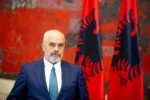With accusations against Serbia for terrorist attacks in northern Kosovo, Kosovo’s chief negotiator Besnik Bislimi is set to attend the high-level Kosovo-Serbia dialogue meeting in Brussels. The meeting is scheduled for December 17, and the EU has confirmed that both parties have confirmed their participation. According to EU spokesperson Anna Hipper, the meeting will focus on the implementation of the normalization agreement between the two countries.
“The European Union and its Member States expect both parties to fully implement all previous agreements. The path to the European Union for both parties goes through the EU-facilitated dialogue. The upcoming meeting of chief negotiators will take place on December 17, where they will discuss several issues, including the implementation of the Agreement on the Road to Normalization,” said Hipper.
The Government of Kosovo has also confirmed their participation in the December 17 meeting in Brussels.
However, Agon Batusha, a member of the Self-Determination Movement (Vetëvendosje), expressed skepticism about the potential topics to be discussed with Serbia, pointing out that Serbia is allegedly sponsoring terrorist attacks in Kosovo.
“We are involved in a dialogue that is no longer truly dialogue, as Serbia has not implemented any of the agreements made in Brussels or the Ohrid annex, and has directly sponsored terrorism within Kosovo’s territory. The terrorist leader Radojičić is hiding in Belgrade and is neither being arrested nor extradited to Kosovo. Serbia is sponsoring the destabilization of Kosovo and the Balkans. Therefore, we do not know exactly what to discuss, especially when the dialogue has been imbalanced, as Kosovo is under EU measures while Serbia is being coddled,” said Batusha.
On the other hand, the opposition continues to criticize the Government for a lack of transparency and concrete results in the dialogue process. PDK (Democratic Party of Kosovo) MP Hajdar Beqa accused Prime Minister Kurti of abandoning the idea of mutual recognition due to the absence of a clear agenda.
“You can’t expect results from a government that is nearing the end of its term, especially when it has not delivered results in four years. Neither the international community nor the citizens expect any results,” said Beqa.







